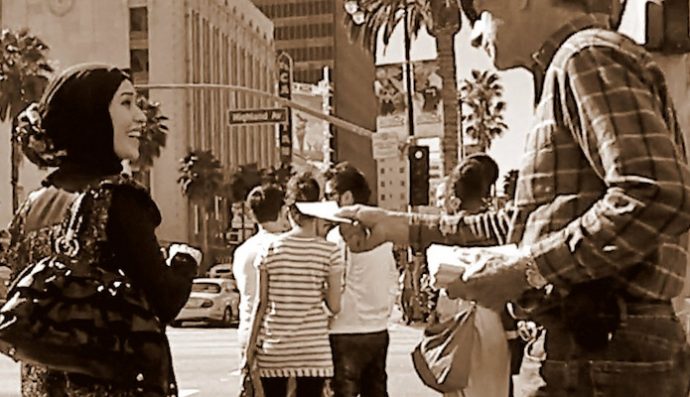You can almost hear the voice of the revival preacher bouncing off the tent folds somewhere in the deep south as he describes the perils of hell and the fact that we’re all headed there. Over and over again comes the question, “Have you been sa-a-a-a-aved-d-d-d-d-d!?!?!?!”
That word, maybe more than any other, has become part of the regular vernacular of Christian churches. We have used it so often that we don’t even think about it any more. We say that “we got saved” at this particular moment or that particular event. We ask others if they’ve been saved. So ingrained is this particular word in the vocabulary of the Christian sub-culture that it became the one word name of the 2004 satirical film mocking it.
When a word rises to that level of usage, when it becomes that much a part of the subculture, when it flows off the tongue of the churchgoer that easily, it’s inevitable that we all stop thinking much about what it actually means. The truth is it’s a good word. It’s the right word. And if we think about the implications that come with using that word, we can see why. Here are three of those implications:
1. Peril.
To say that one is “saved” implies that there is some kind of peril. And not the “boy I sure hope I can get through this traffic in time” kind of peril. The word itself implies danger. Trouble. Hardship. Something that needs to be escaped from. You would have a hard time selling that to the vast majority of the people outside the church, because their lives don’t feel dangerous. They don’t feel particularly perilous. They certainly don’t see much of anything they need to escape from. Truth be told, the word that describes their lives best is something like, “Comfortable.” So being “saved” isn’t something that resonates with them, for they simply don’t see anything they would need to be saved from.
But isn’t that really the worst kind of danger? It’s one matter to be walking through the African savannah and see a lion up ahead. A lion certainly isn’t an animal you want to walk up on; so you stop, you calm yourself, and you start to slowly back away. You sense the danger of the situation, and so you know you need to get out of it as quickly as possible.
But what if you weren’t in the African savannah; what if you were in the South American rain forest. And you were trudging your way through the thick underbrush. So thick were the roots, vines, and foliage that you never saw the venomous snake coiled on the ground. Your boot came down closer and closer and closer and then . . .
You never saw it coming. Clearly that’s a worse sort of danger than the kind you are aware of. But there’s another difference in those two dangerous situations. In the first, due to your awareness, you can play a part in your salvation. You can slowly back away. You can turn and run. But in the second scenario, you truly need to be saved. You need an external force to act upon you in order for you to be delivered. Such is the case with us.
2. Safety.
Not only does the word “saved” imply peril, it implies safety. We were in danger, now we are safe. To be saved is to breathe a deep sigh of relief because we know that we are at last out of harm’s way. This is gloriously true of the Christian, for we are indeed safe.
We are not immune from sickness. We are not exempt from pain. We are not free of trouble or hardship or persecution or sword, and yet through it all we are miraculously safe. So says Jesus:
“My sheep hear my voice, I know them, and they follow me. I give them eternal life, and they will never perish. No one will snatch them out of my hand. My Father, who has given them to me, is greater than all. No one is able to snatch them out of the Father’s hand. I and the Father are one” (John 10:27-30).
When we are saved, we are safe, not just because we have been delivered from peril, but because of who did the delivering. We are safe, in an eternal, lasting, and forever sense, because Jesus has us in His hand.
3. A hero.
We often think being saved is something like this: We are floating in the sea of sin and death about to drown when, with our last bit of strength, we cry out to Jesus who throws us a life preserver. That’s certainly a situation from which we would need to be saved, but that’s not what we see in this passage of Scripture. Instead, the picture here is of a corpse, dead and bloated, floating face down in the sea. No strength. No power. No hope.
That’s what it means to be saved.
And that’s the promised of the gospel. The gospel doesn’t claim to help the weak; it claims to make the dead live again. It is only when we begin to see the true nature of the utter despair of humanity that we begin to see Jesus not as the key to a better life. Not as a sage only teaching about love. Not as a miracle worker only concerned with the alleviation of human suffering.
Jesus is our Hero. He is our Rescuer. And, according to the Bible, He rescues from sin and death. In the ultimate “But God” moment, Jesus reaches down and hauls the corpse of humanity up and breathes new life into it. In so doing, He saves us from sin and its corresponding just punishment: death.
Jesus, the Great Rescuer, has come, and His salvation is the move from spiritual death to spiritual life forever with Him. Let’s say it, remember it, and attribute the credit and honor where it’s due. To God alone be the glory, for He has done for us what we could never do for ourselves. In His great love and mercy, He has saved us.
Subscribe to MichaelKelley.co
Never miss a new post. Subscribe to receive these posts in your inbox and to receive information about new discipleship resources.






Hello, Michael! As always, I find edification in your articles.
Please tell me what is the Bible passage you are referring to in point 3?
Thanks, and God bless your ministry.
Hi, Joy – Thank you for reading. Though there are a number of passages that paint Jesus as a hero, the main one I’m thinking of is Ephesians 2:1-10.